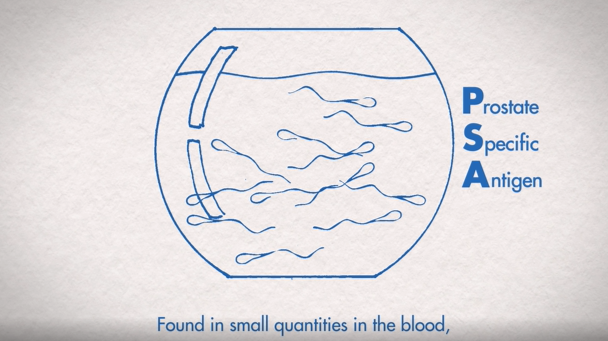The signs are not symptoms you may have, such as urinary tract symptoms, but objective facts your doctor can feel. Currently, a digital rectal examination is the cheapest method of screening for prostate cancer, only partially, because nowadays it is done in tandem with a PSA test. It was also the only method that existed before the PSA test arrived in the 1980s/90s.
The digital rectal examination – which most widely used abbreviation is DRE – presents no risk or contraindication, except in the case of known prostatitis, hemorrhoids or painful anal fissure. Is digital rectal examination relevant? According to the Canadian Urological Association and the College of Family Physicians – yes, it is relevant, but also has its limitations.
Let’s see
It is true that this exam is rather unpleasant, but it is not painful (unless you have undiagnosed prostatitis) and only lasts 10 to 15 seconds. Your doctor puts a gloved, lubricated finger into your rectum to feel your prostate. Since most cancers grow in the peripheral area of the prostate, the one near the rectum, it is quite easy to spot an abnormality.
Under normal condition, your prostate smooth and rubbery. In fact, a healthy prostate feel:
- soft
- spongy
- smooth
- symmetrical
- regular and even
During a DRE, your doctor will look for abnormalities such as a lump or induration (hardening) on your prostate. It is important to note that not all lumps and induration are cancerous: only one in three is. Benign prostatic hyperplasia, calcification (a “stone”) in the prostate, and inflammation of your prostate can also cause these phenomena. Your doctor will therefore look for something abnormal, which in turn will require further testing. We are not talking about a diagnosis at this stage.
Your doctor will raise an eyebrow if…
In some patients with prostate cancer, the hardening is very extensive, and the lump may even protrude from the prostate into nearby tissue. Locally advanced cancer can then be suspected. These data are of prime importance for your family doctor who will immediately refer you to a urologist or help your urologist identify the stage of the disease and therefore the appropriate treatment.
Its limits
But digital rectal examination has its limits. This is because it does not allow your doctor to examine the entire prostate. In addition, most cancers diagnosed in Canada are diagnosed despite a normal physical exam and digital rectal exam. However, it is a necessary basic test because it is always important to know the condition of the prostate. Especially since it can occasionally detect cancers that are present despite normal PSA results.
PSA test and DRE
Note that these two tests are often combined to increase the accuracy of the screening. Be aware, however, that none of these tests can confirm or rule out a diagnosis of prostate cancer. Other tests such as transrectal ultrasound and prostate biopsy are needed to definitively diagnose prostate cancer.
You and doctors in all of this?
According to the College of Family Physicians in a November 2019 article, digital rectal examination remains an important clinical skill to acquire and its utility increases when used in conjunction with other diagnostic tools. Most often, the DRE is used in urology to gain optimal access to your prostate by palpation through the rectum. However, there are other indications for this exam, including examining gastrointestinal masses or gastrointestinal bleeding or as an assessment of symptoms – often related to infection – of your lower urinary tract (your urethra or bladder, with your kidneys considered as upper tract). Thus, the College strongly recommends medical training for resident physicians in family medicine.
For you, this means understanding why a digital rectal examination is performed and that the results may be without consequences, therefore normal, or even abnormal… without or with consequences. With regard to prostate cancer, if your family doctor refuses to do a DRE or even screen for it with tests we have today – PSA test and DRE- you should ask him/her why and ask for a referral if you are not convinced of the answer, especially if you have a risk factor, such as a family history of cancer, if you are a black man, if you inherited a defective gene like BRCA, etc.
So, for everyone, the best approach remains the same: you have to talk about the pros and cons of prostate cancer screening with your doctor, based on your age and/or your risk factors, in order to make an informed decision on this subject.
Discover our new animated videos
Discover three new animated videos, each equally unique and original from one to the other. Be on the lookout!
Here is the first one – Symptoms, Risk and Screening
Take the time to visit each of our pages on this website, as well as our YouTube channel, in order to get familiar with the disease with our expert lectures, our section on available resources, the support that is offered to you.
Do you have any questions or concerns? Above all, do not hesitate. Contact us at 1 855 899-2873 to discuss with a nurse specializing in uro-oncology. It’s simple and free, like all our services.
Pages of our site that might interest you
Want to know more? Just click on one of the links below.
Nutrition and Healthy Weight
Can we prevent cancer?
Diseases related to the prostate
The latest PROCURE news that might interest you
Every week we publish a blog article. Here are some we chose for you.
Men’s Health – 10 Mistakes Not To Do
6 Tips To Keep Your Prostate Healthy
What Your Urine Can Tell You
Sources et references
Le cancer de la prostate – Comprendre la maladie et ses traitements; Fred Saad, MD, FRCSC et Michael McCormack, MD, FRCSC; 5e édition entièrement revue et mise à jour, 2019. © Fred Saad et Michael McCormack, 2019 – Annika Parance Éditeur
Association des urologues du Canada. Recommandations de l’Association des urologues du Canada sur le dépistage et le diagnostic précoce du cancer de la prostate. Citer comme suit à l’origine: Can Urol Assoc J 2017;11(10):298-309.
http://dx.doi.org/10.5489/cuaj.4888
Collège des médecins de famille. Répercussions de la modification des lignes directrices pour l’examen rectal digital sur la formation des étudiants. Elliot Lass and Lucshman Raveendran, Canadian Family Physician November 2019, 65 (11) e497-e499
Ressources Santé – Examen par toucher rectal
Written by PROCURE. © All rights reserved – 2020



 ADDITIONAL RESOURCES
ADDITIONAL RESOURCES


